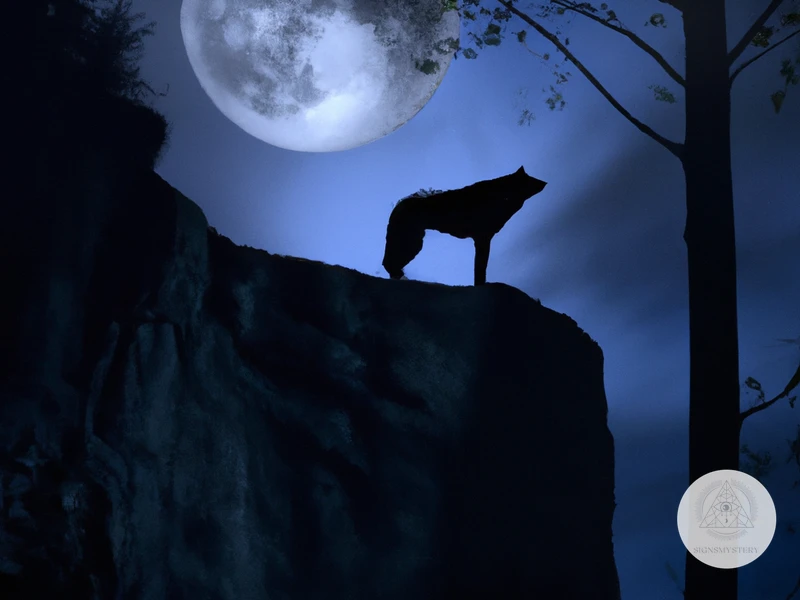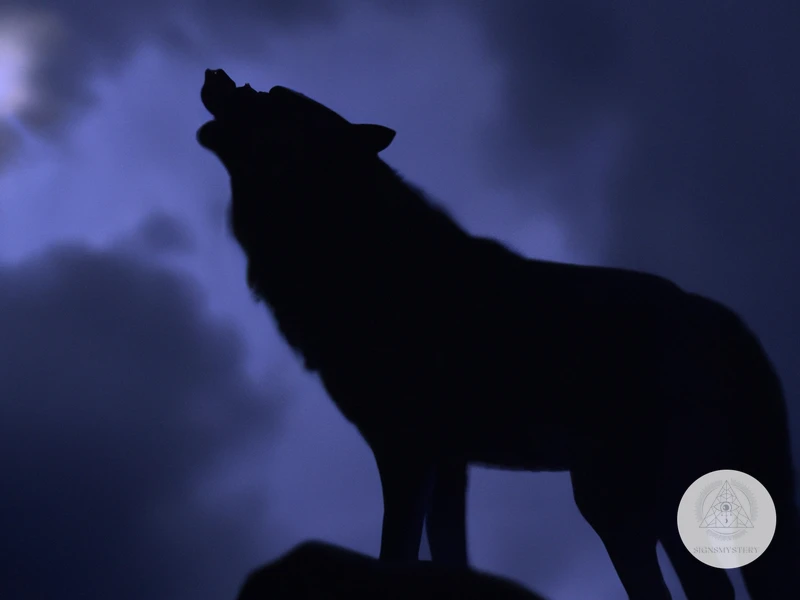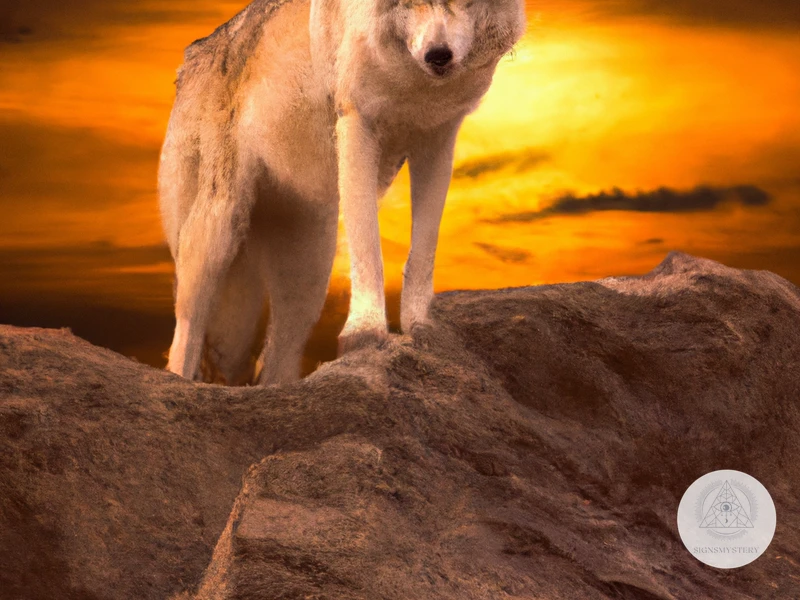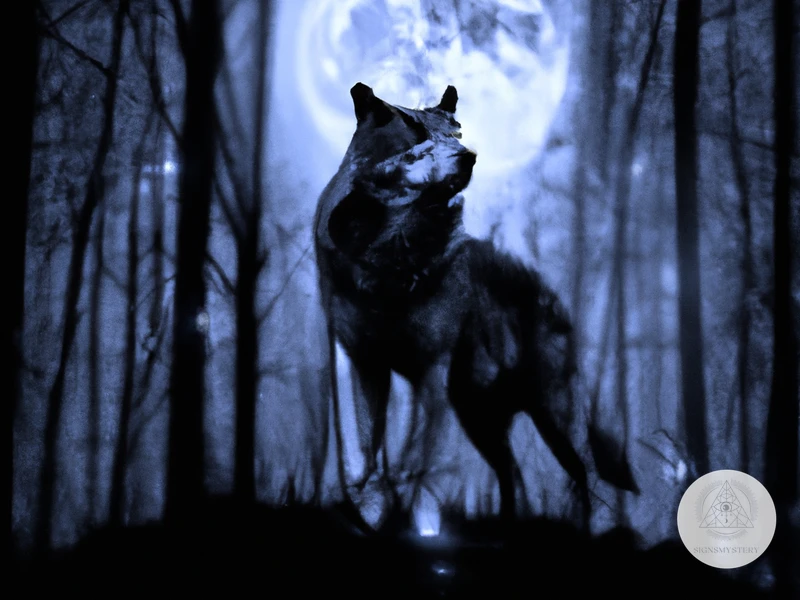The enigmatic and captivating presence of the wolf has long inspired awe, fear, and respect in cultures throughout history. Symbolizing a combination of strength, courage, and protection, the wolf spirit animal holds deep significance in various ancient traditions, mythology, and spiritual practices. By tapping into the energy of the wolf, individuals can find guidance and solace in their quest for courage and protection. In this article, we will explore the symbolism of the wolf, its association with courage and protection, and ways to connect with the wolf spirit animal to harness its empowering qualities. Discover the transformative power of the wolf as we delve into the rich tapestry of its mythical and spiritual existence.
1. The Symbolism of the Wolf

The symbolism of the wolf resonates deeply with cultures and belief systems worldwide. A widely recognized representation of primal instincts and wild nature, the wolf embodies qualities of strength, loyalty, and resilience. In ancient cultural perspectives, the wolf often held dual symbolism, representing both positive and negative aspects. In some Native American tribes, the wolf symbolized courage, leadership, and hunting prowess. Conversely, in Norse mythology, the monstrous wolf Fenrir was feared as a harbinger of chaos and destruction. /celtic-animal-spirit-guide/Wolf symbolism is also prevalent in mythology and folklore. In Native American folklore, the wolf is considered a powerful spirit guide, associated with intuition, intelligence, and survival. Storytellers often depicted wolves as protective guardians and cunning tricksters. The wolf plays a significant role in the creation myths of many indigenous cultures, representing the duality of life and death. From a spiritual perspective, the wolf serves as a potent symbol of transformation, embodying the need for balance and harmony. Connecting with the wolf spirit animal can help individuals tap into their primal instincts, unlock hidden potentials, and navigate through life’s challenges with courage and grace.
1.1 Ancient Cultural Perspectives
Ancient cultural perspectives provide insights into the diverse interpretations of the wolf symbol. In Native American cultures, the wolf holds a prominent place, representing a complex blend of characteristics. The tribes of the Great Plains often viewed the wolf as a symbol of bravery and warrior spirit, valuing its hunting skills and fierce loyalty to the pack. The wolf’s ability to communicate and cooperate within the pack was revered as a model for human society. Additionally, some Native American tribes associated the wolf with spiritual guidance and protection, believing that the wolf spirit could bring wisdom and intuition to those who sought its guidance. In contrast, in Norse mythology, the wolf Fenrir was seen as a foreboding creature associated with chaos and destruction. This ancient perspective reflects the wolf’s dual nature, signifying both positive and negative forces in the world. Understanding these divergent beliefs about the wolf in different cultures allows us to appreciate the richness and complexity of its symbolism. By exploring the multifaceted interpretations of the wolf, we can better grasp the depth of its significance and how it can enhance our understanding of ourselves and our connection to the natural world. Discovering our own connection to the wolf can be a transformative journey, unveiling the power of the spirit animal within. /unveiling-spirit-animal-power/
1.2 Representation in Mythology and Folklore
The representation of the wolf in mythology and folklore showcases the diverse interpretations and cultural significance associated with this mystical creature. In Norse mythology, the wolf Fenrir plays a prominent role. Fenrir, the son of the god Loki, is a monstrous wolf who is destined to bring about the end of the world, known as Ragnarok. This portrayal emphasizes the fearsome and destructive potential of the wolf. However, in other cultures, the wolf is revered as a sacred and wise being. In Native American folklore, wolves are regarded as powerful spirit guides, embodying qualities such as intuition, intelligence, and survival skills. They are often seen as protectors and teachers. The Anishinaabe people believe that wolves communicate with humans through dreams, guiding them on their life path. Wolves are also present in Celtic mythology, symbolizing loyalty, guardianship, and family bonds. They are associated with the goddess Cerridwen, who possesses deep knowledge and insight. Exploring the rich tapestry of wolf symbolism in mythology and folklore offers us insight into the multifaceted nature of this remarkable creature. /spirit-animal-meditation-intuition/By delving into these stories, we can deepen our understanding of the wolf spirit animal and its profound connection to our own lives.
1.3 Spiritual Significance
The wolf holds immense spiritual significance in various belief systems and practices. In Native American spirituality, the wolf is seen as a spiritual teacher and guide, entrusted with protecting and guiding individuals through life’s journeys. The wolf represents a connection to nature and the ability to tap into instinctual wisdom. Its keen senses and strong intuition are believed to provide spiritual guidance and clarity. In shamanic traditions, the wolf is revered as a powerful totem animal, embodying the energy of loyalty, social connection, and spiritual transformation. In /unveiling-spirit-animal-power/spirit animal meditation, individuals often seek the wolf spirit to unlock their own intuition and tap into their inner courage. By embracing the wolf’s spiritual significance, individuals can cultivate a deeper connection to their own instincts, journey inward, and awaken their spiritual potential.
2. The Wolf as a Symbol of Courage
The wolf is widely regarded as a powerful symbol of courage, inspiring individuals to face their fears and overcome challenges. By observing the wolf’s innate bravery and fearlessness, we can draw inspiration and cultivate our own courage. Facing fears and overcoming challenges is an integral part of personal growth and development. The wolf encourages us to confront our deepest fears head-on, just as it fearlessly faces the unknown in its natural habitat. Embracing the wolf spirit animal allows us to tap into our inner strength and resilience, enabling us to navigate through difficult situations with courage and determination. This symbol of courage pushes us to step outside our comfort zones, take risks, and embrace new opportunities. The wolf’s embodiment of courage also extends to inspiring confidence and assertiveness. Just as the wolf asserts its dominance within its pack, we too can assert ourselves and stand up for what we believe in. The wolf teaches us to have confidence in our abilities and convictions, allowing us to navigate through life with a sense of purpose and self-assurance. By embodying the spirit of the wolf, we can unleash our inner courage and become the fearless warriors of our own lives.
2.1 Facing Fears and Overcoming Challenges
Facing fears and overcoming challenges is a fundamental aspect of personal growth and development, and the wolf spirit animal serves as a powerful symbol in this journey. The wolf’s courage and fearlessness inspire individuals to confront their deepest fears head-on and find the strength within to overcome obstacles. Just as the wolf prowls through the darkness with unwavering determination, we too can summon the courage to face the unknown. The wolf teaches us to embrace discomfort and uncertainty, as growth often lies beyond our comfort zones. By embodying the wolf’s spirit, individuals can tap into their inner reserves of resilience and determination, pushing through limitations and emerging stronger on the other side. The wolf encourages us to confront our fears, whether they be fear of failure, fear of rejection, or fear of the unknown, and empowers us to take bold action in pursuit of our dreams. Remembering the wolf’s indomitable spirit can provide the confidence needed to confront challenges head-on, propelling us towards personal transformation and success.
2.2 Embracing Inner Strength
Embracing inner strength is a fundamental aspect of embodying the wolf spirit animal. The wolf teaches us to tap into our innate power, confidence, and resilience. Just as wolves rely on their own instincts and abilities to survive and thrive in the wild, we too can learn to trust ourselves and embrace our inner capabilities. By channeling the energy of the wolf, individuals can find the courage to face challenges head-on, overcome adversity, and push beyond their limits. The wolf teaches us to embrace our uniqueness and stand tall in our convictions, contributing to our self-assurance and unwavering determination. When we embody the wolf spirit animal, we tap into our own well of strength, allowing us to overcome obstacles with grace and determination. It is through this process of embracing our inner strength that we truly discover our potential and unleash the fearless and resilient wolf within us.
2.3 Inspiring Confidence and Assertiveness
The wolf, as a symbol of courage, has the power to inspire confidence and assertiveness in individuals. By observing the wolf’s behavior and nature, we can learn valuable lessons in self-assuredness and standing our ground. Wolves are known for their strong leadership within their pack and their ability to communicate and assert dominance effectively. They have a keen sense of intuition and rely on their instincts to make decisions. By embracing the energy of the wolf, individuals can tap into their inner strength and develop the courage to assert themselves confidently in various aspects of life. Whether it’s speaking up in a professional setting, setting boundaries in personal relationships, or pursuing ambitious goals, the wolf spirit animal encourages us to embrace our own power and showcase our true selves. Just as wolves embody a natural air of authority and confidence, we too can embrace our own assertiveness and exude a similar energy in our lives.
3. The Wolf as a Symbol of Protection

The wolf is widely regarded as a symbol of protection, conveying a sense of security and safeguarding against negative energies. As a guardian spirit and source of intuition, the wolf offers its guidance and protection to those who seek its assistance. The wolf’s heightened senses and keen perception allow it to detect threats and danger, making it an ideal symbol for protection. Many cultures believe that calling upon the wolf spirit animal can create a shield against harmful energies and entities. Within a wolf pack, a tight-knit family unit is formed, emphasizing the importance of familial bonds and the protection of its members. The wolf’s role as a nurturing and protective parent illustrates its commitment to its pack’s well-being. During challenging times, the wolf spirit animal offers protection as a source of strength and unity. By embodying the energy of the wolf, individuals can tap into their own protective instincts, shield themselves from negativity, and create a secure environment for themselves and their loved ones.
3.1 Guardian Spirit and Intuition
The wolf, as a guardian spirit, is closely associated with intuition and heightened senses. Guiding individuals to trust their instincts and inner guidance, the wolf spirit animal encourages us to listen to our inner voice and follow the path that feels right. Just as wolves rely on their acute sense of smell and hearing to navigate their surroundings, connecting with the wolf as a guardian spirit can sharpen our intuitive abilities and help us make more informed decisions in our lives. It teaches us to be aware of our surroundings and to pay attention to subtle signs and messages from the universe. The wolf’s ability to anticipate danger and protect its pack demonstrates the importance of trust and intuition in our own lives. By embracing the wolf as a guardian spirit and tapping into its intuition, we can navigate through life with a heightened sense of awareness and make choices that align with our true purpose and desires.
3.2 Shielding from Negative Energies
When it comes to shielding from negative energies, the wolf spirit animal can be a powerful ally. Known for its ability to detect and ward off danger, the wolf offers its protective energy to those who connect with it. The keen senses of the wolf serve as a metaphorical shield, allowing individuals to sense and repel negative energies that may hinder their well-being. By embodying the essence of the wolf, one can cultivate a sense of awareness, discernment, and intuition to shield themselves from harmful influences. Embracing the wolf spirit can be particularly beneficial for empaths and highly sensitive individuals who may find themselves easily overwhelmed by external energies. The wolf’s innate ability to navigate through challenging environments while maintaining its strength and resilience serves as an inspiration for individuals seeking to shield themselves from negativity. Additionally, the pack mentality of the wolf encourages individuals to seek support from their loved ones and surround themselves with positive influences. This support system can act as a buffer, reducing the impact of negative energies and providing a sense of security and protection. The wolf spirit animal serves as a reliable guardian, guiding individuals in shielding themselves from negative energies and fostering a sense of inner peace and well-being.
3.3 Nurturing Family and Pack Bonding
The wolf’s symbolism extends beyond individual strength and courage to encompass the importance of community and familial bonds. Within a wolf pack, there is a deep sense of unity, support, and nurturing. Wolves exhibit exceptional loyalty and cooperation, working together for the well-being of the entire group. In this context, the wolf spirit animal serves as a reminder of the significance of family and pack bonding. Nurturing family and pack bonding involves fostering connection, trust, and compassion. It emphasizes the importance of being there for one another, sharing responsibilities, and providing emotional support. Like the wolf, individuals who connect with this aspect of the spirit animal are encouraged to prioritize the well-being and harmony of their own families and communities. They recognize the strength and resilience that comes from nurturing these relationships, appreciating the power of unity and the shared journey towards growth and protection. Embracing the nurturing qualities of the wolf can foster deeper connections and foster a sense of belonging within one’s own pack, whether it be familial, social, or professional.
4. Connecting with the Wolf Spirit Animal
Connecting with the wolf spirit animal allows individuals to harness its powerful energy and draw upon its wisdom and guidance. There are several methods one can employ to initiate this connection. Meditation and visualization serve as powerful tools to establish a bond with the wolf spirit animal. Find a quiet and comfortable space, close your eyes, and imagine yourself in a serene forest. Visualize a wolf approaching you, sensing its strength and confidence. Engage in a silent conversation with the wolf, asking for its guidance and protection. Animal symbolism and totemism can also aid in connecting with the wolf spirit animal. Research the cultural significance of the wolf in various traditions and explore its meaning in your personal life. Create an altar or symbolic representation that honors the wolf, such as
Subscribe to Our Newsletter
Sign up to receive the latest news and updates.
4.1 Meditation and Visualization
Meditation and visualization techniques offer profound ways to connect with the energy and spirit of the wolf. Find a quiet and sacred space where you can sit comfortably and undisturbed for a period of time. Close your eyes and take deep, cleansing breaths to relax your body and mind. Imagine yourself in a serene forest setting, surrounded by the beauty and tranquility of nature. Visualize a magnificent wolf approaching you with gentle eyes and a calm demeanor. Feel its presence and energy as you invite the wolf spirit animal to guide and protect you. Allow yourself to connect deeply with the wolf’s essence, absorbing its strength, courage, and protective instincts. Visualize yourself embodying these qualities, feeling empowered and secure in the wolf’s presence. Take note of any messages, guidance, or insights that may arise during the meditation. When you are ready, slowly open your eyes, carrying the energy and wisdom of the wolf with you throughout your day.
4.2 Animal Symbolism and Totemism
Animal symbolism and totemism offer valuable insights into the deeper meaning and connection individuals can have with the wolf spirit animal. Animal symbolism refers to the interpretation and understanding of animal characteristics, behaviors, and traits as symbolic representations. When exploring wolf symbolism, certain qualities associated with the wolf, such as loyalty, community, and intuition, can be reflected upon and integrated into one’s own life. Totemism takes this concept a step further by considering animals as spiritual guides and protectors. For those who feel a strong affinity towards the wolf, embracing it as a personal totem animal can create a profound bond and source of spiritual guidance. Individuals can keep a symbol or image representing the wolf close to them, whether it be in the form of jewelry, artwork, or even within a sacred space. This serves as a reminder of the qualities they wish to embody and the protection they seek from the wolf spirit animal. By incorporating animal symbolism and totemism into their spiritual practices, individuals can tap into the wisdom and power of the wolf to enhance their personal growth and journey towards courage and protection.
4.3 Incorporating Wolf Energy into Daily Life
Incorporating wolf energy into daily life is a powerful way to harness its transformative qualities and draw strength from its symbolism. Here are some practices that can help in embracing and integrating the wolf spirit:
1. Embody courage: Cultivate the courage of the wolf by pushing past your comfort zone and facing your fears head-on. Take on challenges with determination and resilience, trusting your instincts and inner strength.
2. Tap into intuition: The wolf is known for its keen sense of intuition, so hone your own intuitive abilities by practicing mindfulness and /spirit-animal-meditation-intuition/meditation. Listen to your inner voice and trust your gut feelings when making decisions.
3. Stay loyal: Wolves are fiercely loyal to their pack, so embrace the value of loyalty in your relationships. Be there for your loved ones, offer support, and show unwavering loyalty to those who matter most to you.
4. Foster strong bonds: Wolves thrive in a tight-knit pack, so prioritize building strong connections with your chosen family and friends. Nurture these relationships, prioritize meaningful connections, and create a sense of unity and support.
5. Embrace the wild: Connect with nature and find solace in the wilderness. Spend time outdoors, go for hikes, or simply sit in silence, absorbing the energy of the natural world. Embrace your own wild nature and embrace the freedom and spirit of the wolf.
6. Channel assertiveness: The wolf is known for its assertiveness when it comes to protecting its territory and loved ones. Channel this energy in your own life by standing up for yourself, setting boundaries, and asserting your needs and desires.
Remember, incorporating wolf energy into daily life is a personal journey. Find what resonates with you and embrace the qualities that the wolf symbolizes in a way that feels authentic and empowering. By doing so, you can tap into the transformative power of the wolf and live with courage and protection as your guiding forces.
Conclusion

In conclusion, the wolf spirit animal holds profound meaning and symbolism across cultures, mythologies, and spiritual practices. Representing courage, protection, and primal instincts, the wolf serves as a powerful guide for those seeking strength and resilience. Through ancient cultural perspectives, we see the wolf portrayed both as a noble leader and a feared predator. In mythology and folklore, the wolf embodies traits such as loyalty, intuition, and cunning. Spiritually, connecting with the wolf spirit animal can help individuals unlock their inner strength, face fears, and find protection from negative energies. By incorporating the energy of the wolf into daily life through meditation, visualization, and embracing its symbolism, individuals can tap into their own innate power and live with confidence and assertiveness. The wolf reminds us to embrace our instincts, trust our intuition, and cultivate a strong sense of family and community bonds. Through the wolf spirit animal, we learn the importance of balance and harmony within ourselves and our surroundings. Embrace the wolf’s symbolism and let its courageous spirit guide you on your journey.
Frequently Asked Questions
1. How does the wolf symbolize courage?
The wolf symbolizes courage through its portrayal as a fearless hunter and leader in various cultural and mythological contexts. Its ability to face challenges head-on, protect its pack, and navigate harsh landscapes demonstrates the essence of bravery.
2. Can the symbolism of the wolf differ among different cultures?
Absolutely. The symbolism of the wolf varies across cultures. While some view the wolf as a positive representation of strength and loyalty, others see it as a symbol of darkness or chaos. Cultural perspectives shape the interpretation of symbols, creating diverse meanings.
3. How can connecting with the wolf spirit animal provide protection?
Connecting with the wolf spirit animal can provide protection by tapping into its instinctual wisdom and heightened senses. The wolf’s intuitive guidance and ability to sense potential danger make it a powerful guardian and protector.
4. What role does the wolf play in meditation and intuition?
The wolf serves as a spiritual guide in meditation, helping individuals access their intuition and inner wisdom. By envisioning oneself in a wolf’s presence during meditation, one can gain clarity, trust their instincts, and enhance their intuitive abilities.
5. How can the wolf symbolize family and pack bonding?
The wolf symbolizes family and pack bonding through its strong social structure and devotion to its pack. Wolves rely on teamwork, communication, and nurturing behaviors within their pack, serving as a reminder of the importance of close-knit relationships and support systems.
6. Are there any negative aspects associated with the symbolism of the wolf?
While the wolf is often revered, some cultures associate negative aspects with its symbolism. In certain myths, the wolf represents destruction, chaos, and darkness. However, it’s important to remember that symbolism can differ based on cultural interpretations.
7. How can the wolf represent resilience?
The wolf represents resilience through its ability to adapt to various environments and thrive even in harsh conditions. Its instincts, resourcefulness, and endurance serve as a powerful reminder of the importance of resilience in the face of adversity.
8. Can anyone connect with the energy of the wolf spirit animal?
Yes, anyone can connect with the energy of the wolf spirit animal. Through meditation, visualization, and exploring the symbolism of the wolf, individuals can tap into its empowering qualities and incorporate them into their daily lives.
9. How can the wolf symbolize assertiveness?
The wolf symbolizes assertiveness through its dominance within its pack and its ability to protect its territory. By drawing inspiration from the wolf, individuals can cultivate assertiveness, speak their truth, and stand up for themselves and their beliefs.
10. Are there any other spirit animals that share similar qualities with the wolf?
Yes, there are several spirit animals that share similar qualities with the wolf. For example, the bear symbolizes courage and protection, while the eagle represents strength and vision. Exploring different spirit animals can provide unique insights and guidance on one’s journey.
References
Frequently Asked Questions
FAQs about Finding Courage and Protection in the Wolf Spirit Animal:
Here are some frequently asked questions about finding courage and protection in the wolf spirit animal:
1. How can the symbolism of the wolf help us in our lives?
The symbolism of the wolf can help us by inspiring courage, strength, and confidence. It can guide us in facing our fears and overcoming challenges.
2. Are there any ancient cultural perspectives on the wolf symbol?
Yes, many ancient cultures viewed the wolf symbol as a source of protection and guidance. For example, Native American tribes saw the wolf as a powerful spirit animal that possessed both protective and transformative qualities.
3. Can the wolf symbol provide spiritual significance for individuals?
Yes, the wolf symbol can hold spiritual significance for individuals. It can serve as a guide and teacher, helping individuals tap into their inner wisdom and intuition.
4. How can the wolf represent courage?
The wolf represents courage by demonstrating the ability to face fears and challenges head-on. It teaches us to be resilient, confident, and assertive in our actions.
5. In what ways does the wolf symbolize protection?
The wolf symbolizes protection by acting as a guardian spirit, guiding and shielding individuals from negative energies. It also fosters a sense of community and family, nurturing and protecting the pack.
6. Can connecting with the wolf spirit animal help us develop our intuition?
Yes, connecting with the wolf spirit animal can help us develop our intuition. By tapping into its energy, we can heighten our awareness and make more intuitive decisions in our lives.
7. How can incorporating wolf energy into daily life be beneficial?
Incorporating wolf energy into daily life can be beneficial by instilling a sense of courage and protection. It can inspire confidence, assertiveness, and a strong sense of personal boundaries.
8. Are there specific meditation techniques to connect with the wolf spirit animal?
Yes, there are specific meditation techniques that can help individuals connect with the wolf spirit animal. These techniques involve visualizing oneself as a wolf, immersing in the wolf’s energy, and seeking guidance and wisdom.
9. What is the difference between animal symbolism and totemism?
Animal symbolism refers to the use of animals as representations of certain qualities or characteristics. Totemism, on the other hand, is the belief in a spiritual connection or kinship with a particular animal, considering it as a personal totem or guide.
10. Can anyone connect with the wolf spirit animal, regardless of their cultural background?
Yes, anyone can connect with the wolf spirit animal, regardless of their cultural background. The wolf symbol is universal and speaks to the shared human experiences of courage, protection, and intuition.










